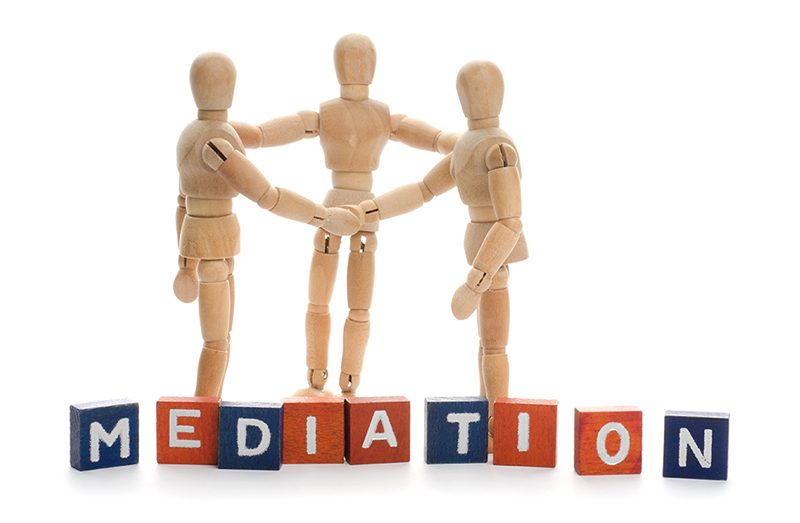IS MEDIATION RIGHT FOR YOU?

If you are involved in a legal matter in or near the Dallas-Fort Worth (DFW) Area of Texas, most Courts will require mediation of the matter, prior to allowing it to go to trial. The idea behind this requirement is to allow the parties, through a neutral third party (the Mediator) to go through the legal problems necessitating the legal action/lawsuit, negotiate possible settlements, and possibly resolve the matter prior to the final trial date set by the Court.
Most people are not familiar with the process of Mediation—of what occurs during a mediation or how it actually “works”. People are often concerned that they (and their attorney) will be “put into a room” with the opposing party and their attorney, to “try and work things out” between them. However, these fears are for naught—as this is rarely, if ever, the case in Mediation.
Mediators are a neutral third party, experienced in the type of case being mediated, who are hired to hear the facts of the matter at hand and assist the parties in resolving the issues. It is not their job (nor are they allowed) to provide legal advice, nor is it their job to make any type of “judgment” in the matter. Mediators are simply there to hear each party’s “side” as to what the ongoing issues are, why they’re involved in the legal matter, and what they want/need/would like to see happen in order to resolve the matter, without having to go through the time and expense of fully litigating the matter in a trial before the Court.
In determining whether you think Mediation is “right” for you and your case (or if you have been Ordered to Mediation by the Judge), here’s what you can expect at Mediation:
Your attorney and the other party’s attorney will propose mediators they are familiar with and decide on who to use for the mediation. (Factors such as mediator cost, availability and experience in the type of legal matter at hand will all be considered at this time and discussed with the client(s)). Upon deciding on a mediator and booking them for the mediation, the client(s) are informed as to the time, date, location and cost—and as to what the mediator’s expectations are regarding timing of payment(s) to be received prior to the mediation occurring. (The client usually pays the Mediator their fees, direct to the Mediator prior to Mediation).
Prior to mediation, the attorneys for both parties will provide the mediator with a copy of any pertinent pleadings and will provide them with an overview of what is going on in the matter currently – including any offers of settlement that have been made to date. This is required by the Mediator so they will have a working knowledge of the matter prior to mediation, so they don’t waste valuable mediation time getting familiar with the facts of the case being mediated.
Upon arrival to the Mediator’s office, you and your attorney will be placed in a room together. (The room often has a table, seating options, a phone, snacks, drinks, and on occasion a TV). The opposing party and their attorney are placed in a similar but separate room, often down the hall so the parties themselves do not run into each other during breaks or trips to the restroom. Since the mediation process usually lasts a full day, it is suggested that clients bring any work they may need to accomplish, a good book, their laptop or ipad—so they have something to do while waiting on the mediator to return from the other party’s room.
Throughout the day, the Mediator will go back and forth between the parties with any offers and counter-offers until either the parties come to agreement or the mediation time expires. However, if the parties are close to settlement when the allotted time expires, the Mediator will often extend the mediation time (if possible) to allow the parties continued progress toward settlement of the issues. If the parties are unable to settle, they must decide if continued mediation attempts are likely to ultimately result in settlement, or if it is obvious settlement is just not possible, counsel for the parties will notify the Court that despite their efforts, mediation was not successful and they will need to continue to proceed to trial.
On the other hand, if the parties do come to agreement and resolve the matter in mediation, the Mediator will prepare a “Mediated Settlement Agreement” (“MSA”), which will detail the agreements of the parties, both parties and their attorneys will sign, as a binding agreement. The Court will be notified that the parties have settled the matter in mediation, a copy of the MSA will be filed with the Court and the final settlement documents will be prepared by the attorneys, based on the terms in the MSA, and filed with the Court upon execution by the parties involved.
Mediation—it is always a good alternative to trial—to attempt to settle/resolve the legal issues for many reasons:
- It allows the parties themselves to have a say in what the final resolution of the matter is (as opposed to a Judge who knows neither party nor their specific issues, until the day of trial when the attorneys present the issues in Court).
- It is less time consuming, for both the parties involved and for their attorneys.
- It is much more cost effective for the client(s), as the attorneys in the matter no longer have to review tons of documents, discuss the pros/cons/possibilities of trial to their clients, prepare their clients for trial, other witnesses and experts for trial, prepare their legal/trial strategy, exhibits, etc. All of which takes a great deal of time and effort, thus can become very costly to the client.
If you currently have a pending legal matter and/or are considering Mediation—give us a call today for your FREE Consultation with a member of our legal team.


